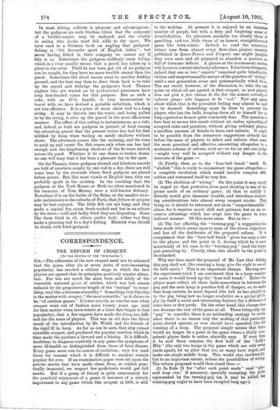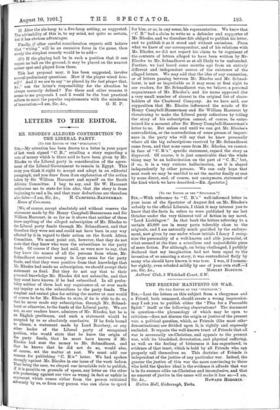CORRESPONDENCE. •
THE REFORM OF CROQUET.
[To THE EDITOR OF THE "SPECTATOR."]
Snt,----The adherents. of the new croquet need not be Ashamed that the game; after six or seven yeal.s of ever-increasing popularity, hits reached a critical stage in which the best players are agreed that its principles positively require altera- tion. For has not much the same been said lately of the venerable national game of cricket, which was last season reduced by the preposterous length of the "innings" to some- thing verylike a tiresome absurdity ? Something very like this is the. matterwith croquet, " the most scientific," as it claims to be,-" of outdoor games." It is not exactly, as was the case when cioqiiet went out - of fashion some twenty years ago (and for that matter whenlawn-tennis at a later date began to lose popularity), that a . few experts have made the thing too diffi- cult-for the mass of players. This was in old days the direct result of 'the introduction.* Mr. Walsh and his friends of theligid 31 in. hoop. - As far -as can be seen, that step ruined scientific croquet, and produced the popular reaction which in time made the pastime a byword and a hissing. It is diffivelt, doubtless; to diagnose correctly in.any game the symptoms of mere. ill-health as distinguished from those of fatal disease. Every game must run its course of evolution ; very few (and those for reasons which it is difficult to analyse). remain popular for ever. If an examination paper were set.upon the precise merits that have made- chess, fives, or cricket :prac- tically: immortal, we • suspect few prqficients would get full marks. But if a grasp of theory is quite unnecessary. for Om-practical enjoyment of a game, it becomes of a certain importance to any game which, like croquet in 1901, is still in the making. At present it is enjoyed by an immense number-of people, but with a. 'deep and lingering sense 'of dissatisfaction. -Its pleaSures resemble too closely -those of gambling, and too ,little those of an honest; straightferward game like lawn-tennis. Indeed, to read- the numerous letters (one from almost every -first-class player) recently published in Lawn-Tennis and Croquet, one might- imagine they were each and all -prepared to abandon a; pastime so full of tiresome defects. A' glance- at the tournament entries will, however, correct this hasty inference. It has been whispered, indeed, that one or two " experts" remained quite blind to the vicious and unsportsmanlike nature. of the practice' of ' wiring" until a new 'generation arose and systematically, wired them, The net result, however, of the discussion, to • take the one point on which all are agreed, is that croquet, as now played, does not give a fair chance to the (for the nonce) unlucky or inferior player who happens to be "our Novr any game about which that is the prevalent feeling may almost be said to be doomed. Something must be done to prevent the player, who has the balls, keeping them all to himself for so long a period as he now quite commonly does. The question is how best-to secure this result without an- undue uprooting of accepted rules and practices, without giving ordinary players a needless amount of, details to learn and unlearn. It ought to be possible from the numerous suggestions already laid before the mass of players to select and enforce what seem the most practical and effective, amounting altogether to a moderate scheme of reform, such as—so far as one can judge -might very well be accepted without any' danger to the interests of the game :— (1) Firstly, then, as to the " four-ball break " itself. ' To " abolish " this is really to reconstruct 'the game altogether,- a complete revolution which would involve complex diffi- culties and commend itself to very few.
(2) The abolition of " wiring." On this point it may surely be urged' (a) that protection from good shooting is one of the prime needs of an ordinary game ; (b) that to nullify it directly would give immense- trouble, and introduce disturb- ing considerations into almost every croquet, stroke. That being so, it should be reformed, not as an " unsportsmanlike" abuse, for it requires much skill and patience, but as an ex- .cessive adVantage which has crept into the game in some indirect manner. Of this-more anon. But as tia- (3) The law affecting the " turning-peg," a suggestion has been made which seems open to none of the above objections, and has all the desiderata of the proposed reform: - It' is complained 'that the "four-ball break '° gives too easy a time to the player, and the point in it, during which he is most 'notoriously at his ease, is the "'turning-peg" (and theloops just preceding it). Clearly, then, this should be the point to be attacked.
Why not then enact the proposal of Mr. Law that-hitting this peg shall not, like running a hoop; give the right to use all the balls again? This is an important change. Having seen the experiment tried, I am convinced that in a large number of cases it would break up the." four-ball break." Either the player must collect all three balls somewhere in between the . peg and the next hoop (a practice full of danger), or, to make that hoop certain, he must depend (the ball he has played-up to the peg being now no longer available) on a spring of the peg (in itself,a novel and interesting feature) for a distance of some four or five yards. On the other hand, this change does not derange the rest of the game at all. There being only one "peg" to consider, there is no misleading analogy. to avoid, since there is no reason..why the making of that particular point should operate, or ever should have operated,, like the running of a hoop. The proposal simply means that there would no longer be a point in the game where a (fairly, corn' petent) player' finds it rather absurdly easy. If' even then it be said there- remains . the first half of the "1ady's Mile " ,(the only two hoops in the game which are only seT.en yards apart), let us, alter that too, as many haye urked,alia make one single middle hoop. This would also incidentally; bid to an important extent, reduce the possibilities of wirMg• The reform proposed would then stand thus :- (1) In Rule 11 for "after. each point made" read "!tfier each hoop run," if necessary, specially excepting the pohlt represented. by the turning-peg (as, it - may be *added, the winning-peg ought to have been excepted long ago !) (2) Alter the Six:hoop to 'a five-hoop setting, as suggested. The advisability of this is, to my mind, not quite so certain, but it has obvious advantages.
Finally, if after careful consideration experts still belieie that "wiring." will be an excessive force in the game, then surely the simplest remedy would be to add— (3?) If the playing ball be in such a position that it can roquet no ball on the ground, it may be placed on the nearest corner spot and played from there.
This last proposal may, it has been suggested, involve several prelimbiaay questions. How if the player wired him- self ? And if we are to say " so placed by the last player that, &c.," • can the latter's responsibility for the situation be always correctly defined ? For these and other reasons it seems to me proposals 1 and 2- -would be -the best practical reform to -meet the popular requirements with the minimum



































 Previous page
Previous page